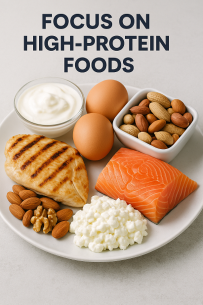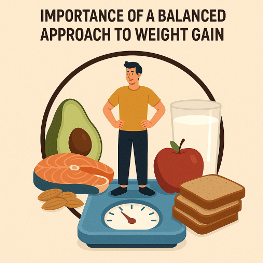Health And Wellness
Table of Contents
ToggleAlthough gaining weight may seem easy, it actually requires a significant amount of planning to do so in a healthy, effective, and sustainable manner. This guide will help you learn how to gain 4 kg in a month, whether you want to build muscle, get back to your normal weight after being sick, or reach your fitness goals. By the end, you’ll know not only how to gain 4 kg in a month but also how to ensure it aligns with your overall health and fitness goals.
Before starting any weight gain plan, it’s important to know what you want to accomplish and how long you think it will take. You should expect to gain about 0.5 to 1 pound every week. This makes sure that you’re mostly gaining muscle and not fat.
Find out how many calories you need each day based on your basal metabolic rate (BMR) and level of activity. Then, add a calorie surplus of 300 to 500 calories (calorie surplus) per day to help you gain weight in a healthy way (healthy and sustainable way). There are many tools, like a calorie calculator, that can help you figure out how many calories you need each day.
Knowing how many calories you eat is an important part of gaining weight (calorie intake). The BMR is the number of calories your body needs to do basic things like breathing and digesting food when you are at rest. Adding more calories than this baseline will cause you to gain weight, especially if you also do structured workouts. You can use apps or a kilojoule-counter book to keep track of what you eat to make sure it’s accurate. Checking your body mass index (BMI) (body mass index) from time to time is also a beneficial way to see how far you’ve come.
Protein is what muscles are made of, and eating more protein is very important (protein diet). Try adding things like Greek yogurt, whey protein, protein powder (Endura Mass), and lean proteins like chicken, fish, and eggs. You should try to get 1.2 to 2 grams of protein for every kilogram of body weight (protein foods).

Healthy fats are a beneficial way to get more calories without using unhealthy methods (healthy calories). Adding foods like olive oil, avocado, vegetable oils, and nut butters to your meals is a wonderful way to get started. These choices are high in calories, but they will also help your heart health.
Instead of three big meals, try eating smaller, more frequent ones. Add snacks like protein shakes, foods high in energy (energy-dense foods), and even cheese, which is higher in fat, to your diet.
Example of a Meal Plan (meal plans)
Regular cardio is important for heart health (cardiovascular exercise), but too much cardio can make it harder to build muscle because it burns the same calories you want to keep. Don’t do too much cardio; instead, focus on building up your muscles.
It’s not enough to just eat more when you want to gain weight; you also need to build a strong body. Strength training (resistance training) (resistance exercise) will help you build more lean muscle instead of fat (lean muscle gains). Desert barbell strength gym style programs and structured resistance workouts work well.
To keep your muscle mass growing (muscle hypertrophy), focus on progressive overload. Over time, slowly add more weight, sets, or reps to what you lift. Compound exercises like squats, bench presses, and deadlifts (compound exercises, free weights, weight machines) will further support muscle mass development (muscle mass). The best results will come from using this method along with a diet high in calories (high-calorie diet).
It’s important to stay hydrated, but you can drink calorie-rich drinks (calorie-dense drinks) instead of regular water while trying to gain weight. You can get the fluids you need along with healthy foods by drinking things like milk, meal replacement drinks, or fruit juices (energy drinks).
After a workout is the best time to eat foods high in protein and carbs (carbohydrates (carbs)). A protein shake made with a banana or oats is an effective way to obtain both fast-digesting carbohydrates and protein, which help repair muscles (fibrous carbohydrates).
Your workouts and diet are not as important as getting enough sleep. Not getting enough sleep can have a big effect on your thyroid levels (thyroid gland), which control your metabolism and stop you from building muscle. Make sure you get 7 to 9 hours of sleep every night without being disturbed (water after meals). Your immune system will be grateful!
Regularly monitoring your weight can assist you in determining what is effective and what requires adjustments. Monitor the ratio of body fat gain to lean muscle gain (body fat gains) to assess the effectiveness of your plan.
If you’re not gaining weight, review your diet changes (dietary changes). Make sure you’re eating foods that are high in calories and slowly adding more when you need to. If you need help with your nutrition, talk to a certified health care provider (personalized nutrition plans, care ai, certified trainers, GLP-1 options)
For any weight gain goal to work, you need to be consistent. To achieve long-term success, monitor your food intake (food intake), maintain a balanced diet, and consistently engage in weight training.
Don’t drink sugary drinks, eat processed foods, or use dangerous “quick fixes” like supplements that aren’t regulated (food and drug administration). These methods can cause unhealthy fat to build up and put your health at risk, such as with heart disease (cardiovascular disease), thyroid problems (thyroid issues), or bone fractures (bone fractures).
Common challenges and how to overcome them
It’s easy to get caught up in the scale, but it’s important for your long-term health to find a healthy and long-lasting way to gain weight (healthy and sustainable way). Eat foods from all the main food groups (nutrient-dense foods), work out with a purpose, and follow the advice of groups like the American Heart Association (nhs fitness studio, healthier families, physical activity guidelines for americans).

Once you reach your goal weight, you should focus on keeping it off. Keep eating many calories, but make small changes to fit your new needs. Controlling your food and activity levels can help you avoid a big weight loss.
After a workout is the best time to eat foods high in protein and carbs (carbohydrates (carbs)). A protein shake made with a banana or oats is an effective way to obtain both fast-digesting carbohydrates and protein, which help repair muscles (fibrous carbohydrates).
To gain weight, you should try to eat 500 to 700 more calories than you burn each day, depending on your activity level.
Yes, scientifically proven options like whey protein and protein powder can speed up results.
The best way to get stronger is to do resistance training and strength training exercises like squats, bench presses, and deadlifts (free weights, weight machines).
